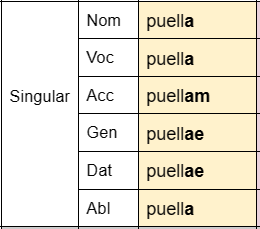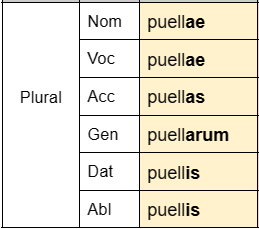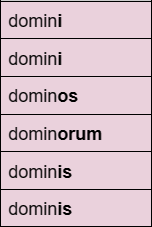What's going on with Latin's 3rd declension?
And why is it so weird?
Today we're going to look at third declension nouns.
Patterns are essential
In Latin, the first and second declension nouns are actually fairly straightforward. They follow very easy patterns.
1st Declension
All 1st declension nouns follow this pattern of endings, and they stay the same in the stem, so they're easy to spot. You know what that root word puell- means: “girl”.
2nd Declension
This is also fairly easy.
They are relatively easy to spot. Again, you just take off the ending and you know what that root word means.
3rd Declension
The third declension, however, seems more stressful. But it isn't! You will notice that it also follows a very easy pattern.
The problem with it, that people find, is that the stem can change. And it changes slightly, but it can put people off.
Here are three very common third declension nouns:
1. rex - king
The reason people find rex difficult is because it doesn't just add the endings onto r-e-x, that would be very simple.
But the Romans didn't like the sound of rexem, which is what would be the accusative. Instead, they do regem, so that -x- changes to a -g-. And that's purely based on the fact that
a) it sounds nicer, so they like it, and
b) it becomes more common in usage. It's almost like slang. They get sloppy with how they pronounce words. Instead of saying rexem, it changes and softens to regem as the language developes.
2. mercator - merchant
mercator does something a little bit different. No letters are taken off the stem, nothing changes. Instead, the ending is added straight on to that stem.
That's quite different from the first and second declension. In puella, 1st declension, you take off the -a and you add -am. In servus you take off the -us and add the ending like, servi, with an -i. But in this one, we just add straight on to the stem.
And you will notice that those endings are exactly the same as added on to the reg- stem of rex. The accusative -em. The generative -is, the dative -i, and the ablative -e.
3. canis - dog
And the same endings are used for canis.
Canis is different again, for this one take off the -is from the nominative and get can-, which is the stem. And onto that you add the endings, -em, -is, -i, -e.
But why are there different groups of nouns?
The reason they're so different is not that the Romans are annoying, it's that later scholars have grouped them together.
The Romans, when they were speaking and writing Latin, didn't think, “oh, I'm going to use a third declension noun now. How do I decline canis again?”
No, their words just fell into patterns over common usage. It was instinctive for them to use the correct endings.
It is later scholars who have grouped them together, mainly to make it easier for us to learn Latin. So it's not the Roman's fault. So instead blame some eleventh century monk or someone.
Learn the Endings
But actually, it's very helpful. If you know the tables of endings for the first, second, third declension, you then know the case of almost every noun you're going to meet.
Trick of the Trade
Now you might say, “how do I know? If first and second are so easy to spot, how do I know it's a third declension?” Well, the really simple answer is you look in your dictionary or vocab list. Any good list will show nouns in this format:
canis, canis - dog
mercator, mercatoris - merchant
puella, puellae - girl
servus, servi - slave
rex, regis - king
This is nominative singular, so rex, followed by the genitive singular, regis. And this shows you how that noun changes. If the word has a stem change, or if the endings are added on the end of the nominative.
The genitives are different for each declension, and so this helps you to learn which declension your nouns are in.
So if you see mercator, mercatoris in your dictionary, you know that is a third declension noun, AND you know that the endings are added on to the full mercator- stem (because the genitive ending -is is on the end of the stem).
Not too painful!
Hopefully the third declension is not as confusing as it seems to begin with. The stem changes are just for, well, aesthetic reasons, really. And the ones that do change, like the ones that add endings to the whole nominative, it's because they like the sound again. So, mercator, they don't like mercaten, they keep the -or- syllable from the nominative.
And that's really all there is to it. But if you're still struggling with noun endings, especially the third declension, you can download my Free Noun Endings Guide here. It'll really help you out, it's got all the endings for 1st, 2nd and 3rd declension in nice clear tables, with all the explanations of what the cases do.
What's your favourite 3rd declension noun?
It's a bit of a rogue question, but humour me! I think genuinely rex is one of mine, but I do have a soft spot for mercator. Let me know in the comments, and I'll see you next time on bambasbat!






